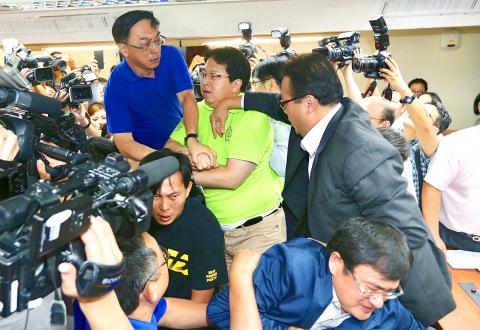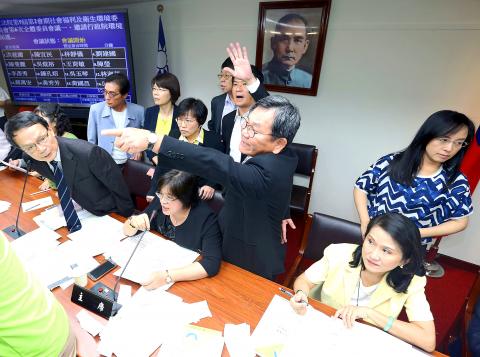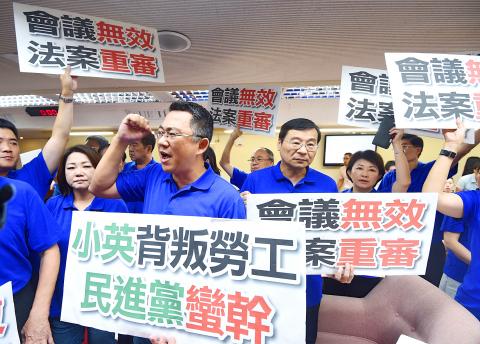Fighting broke out at a meeting of the Legislative Yuan’s Social Welfare and Environmental Hygiene Committee yesterday as the Democratic Progressive Party (DPP)-controlled committee approved a controversial amendment to the Labor Standards Act (勞動基準法).
Torn papers and signs littered the committee chamber’s floor and desks after a 20-minute fracas that saw Chinese Nationalist Party (KMT) legislators throw themselves against a cordon of Democratic Progressive Party (DPP) lawmakers.
“How can you bully us like this,” KMT Legislator Alicia Wang (王育敏) shouted, grappling at the arms of several DPP legislators as fellow KMT members yelled for the consideration of a motion to overturn a review conducted on Oct. 5.

Photo: Chien Jung-feng, Taipei Times
KMT Legislator Arthur Chen (陳宜民) climbed onto the first row of desks in front of DPP Legislator Wu Yu-chin (吳玉琴), one of the committee co-conveners, and engaged in a tussle with DPP Legislator Chiu Chih-wei (邱志偉) before being pushed off by DPP Legislator Su Chen-ching (蘇震清).
The fracas erupted after Wu refused to take up a KMT motion following the official reading of minutes from the committee’s Oct. 5 meeting, instead relying on the DPP majority guarding her desk to confirm the minutes despite objections.
DPP members of the committee had moved to send the amendment directly to cross-caucus negotiations when the review began earlier this month, with the confirmation of the minutes being the final step before the amendment leaves the committee, following several weeks of break as the legislature held confirmation hearings for nominees for the Council of Grand Justices.

Photo: CNA
The amendment has stirred controversy, as it seeks to cut seven national holidays with the implementation of a five-day workweek with one mandatory day off and a “flexible rest day.”
After KMT legislators prevented the confirmation of the minutes by occupying the co-conveners’ desk on Wednesday, dozens of DPP legislators the same night locked themselves in the committee chamber and used their bodies to block the desks the moment the doors opened yesterday.
KMT legislators lined up in front of their DPP counterparts shortly after entering the committee chamber, claiming to be waiting to take their turn for “procedural remarks” and clamoring for Wu to yield the floor.

Photo: Chien Jung-fong, Taipei Times
“All we demand is that the recordings [of the earlier meeting] be brought forward to correct the minutes,” KMT caucus whip Sufin Siluko (廖國棟) said.
After the minutes were confirmed, Sufin Siluko led other KMT lawmakers to the Control Yuan and Taipei District Court to protest, saying that the DPP’s “railroading” of inaccurate minutes made the party liable for falsification of documents.
Meanwhile, Wu told a news conference that the meeting was conducted fully in accordance with legislative procedures.
She said she decided that the committee would not consider a proposal filed by the KMT caucus about the proceedings of the Oct. 5 meeting, because it did not address the proceedings, but merely raised procedural questions.
The committee would have considered a motion to review the proceedings only if there was a mistake or omission, she added.
She put her decision to a vote, and it was approved 7-0, because no KMT legislator voted during the commotion.
She also rejected a proposal raised by the New Power Party (NPP) caucus because a caucus could not raise a proposal in a committee where it has less than three legislators, and only NPP Legislator Hung Tzu-yung (洪慈庸) is a member of the committee.
The amendment is a responsible legislation to ensure a five-day workweek, unify the nation’s various leave schemes and increase paid annual leave for employees, DPP caucus chief executive Wu Ping-jui (吳秉叡) said.
“Whoever is against the legislation does not have to support the DPP in the elections,” he added.
Wu Ping-jui accused the KMT and the NPP of employing double standards, as both demanded that hearings about the amendment be held, but they made no such demands when Wang chaired a committee meeting in July and approved a KMT amendment to the act.

Tropical Storm Gaemi strengthened into a typhoon at 2pm yesterday, and could make landfall in Yilan County tomorrow, the Central Weather Administration (CWA) said yesterday. The agency was scheduled to issue a sea warning at 11:30pm yesterday, and could issue a land warning later today. Gaemi was moving north-northwest at 4kph, carrying maximum sustained winds near its center of up to 118.8kph and gusts of 154.8kph. The circumference is forecast to reach eastern Taiwan tomorrow morning, with the center making landfall in Yilan County later that night before departing from the north coast, CWA weather forecaster Kuan Shin-ping (官欣平) said yesterday. Uncertainty remains and

SEA WARNING LIKELY: The storm, named Gaemi, could become a moderate typhoon on Wednesday or Thursday, with the Taipei City Government preparing for flooding A tropical depression east of the Philippines developed into a tropical storm named Gaemi at 2pm yesterday, and was moving toward eastern Taiwan, the Central Weather Administration (CWA) said. Gaemi could begin to affect Taiwan proper on Tuesday, lasting until Friday, and could develop into a moderate typhoon on Wednesday or Thursday, it said. A sea warning for Gaemi could be issued as early as Tuesday morning, it added. Gaemi, the third tropical storm in the Pacific Ocean this typhoon season, is projected to begin moving northwest today, and be closest to Taiwan on Wednesday or Thursday, the agency said. Today, there would likely

DISRUPTIONS: The high-speed rail is to operate as normal, while several airlines either canceled flights or announced early departures or late arrivals Schools and offices in 15 cities and counties are to be closed today due to Typhoon Gaemi, local governments announced last night. The 15 are: Taipei, New Taipei City, Taoyuan, Tainan, Keelung, Hsinchu and Kaohsiung, as well as Yilan, Hualien, Hsinchu, Miaoli, Chiayi, Pingtung, Penghu and Lienchiang counties. People should brace for torrential rainfall brought by the storm, with its center forecast to make landfall on the east coast between tonight and tomorrow morning, the Central Weather Administration (CWA) said. The agency issued a sea warning for the typhoon at 11:30pm on Monday, followed by a land warning at 11:30am yesterday. As of

CASUALTY: A 70-year-old woman was killed by a falling tree in Kaohsiung as the premier warned all government agencies to remain on high alert for the next 24 hours Schools and offices nationwide are to be closed for a second day today as Typhoon Gaemi crosses over the nation, bringing torrential rain and whipping winds. Gaemi was forecast to make landfall late last night. From Tuesday night, its outer band brought substantial rainfall and strong winds to the nation. As of 6:15pm last night, the typhoon’s center was 20km southeast of Hualien County, Central Weather Administration (CWA) data showed. It was moving at 19kph and had a radius of 250km. As of 3pm yesterday, one woman had died, while 58 people were injured, the Central Emergency Operation Center said. The 70-year-old